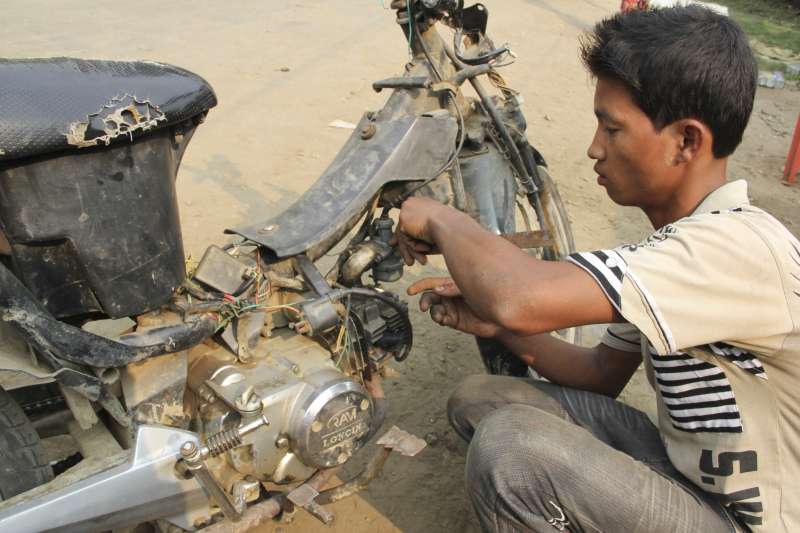News Stories, 26 April 2012
On the street outside his motorcycle repair shop, Nyi Nyi Naing, 18, repairs a customer's battered machine.
MAUNGDAW, Myanmar, April 26 (UNHCR) – As a
young boy, Nyi Nyi Naing dreamed of becoming a mechanic. When his
parents died three years ago, the then 15-year-old knew he had to make
his dream come true.
Today, thanks to training provided by the UN refugee agency, the
determined young man runs his own motorcycle repair shop in this small
but fast-growing town in western Myanmar. He's believed to be the
youngest entrepreneur in town.
"When I was young, I was always interested in mechanics," says Nyi
Nyi Naing, who completed only eight years of formal education. "Before, I
could only do small repairs, like change spark plugs."
His life changed when he heard about courses for mechanics offered by
Bridge Asia Japan (BAJ) and funded by UNHCR. These teach men and women
how to repair motorbikes and cars. With this area of Rakhine state
developing quickly and vehicle ownership increasing, demand for repair
services is taking off.
BAJ instructor Than Htaik Win, a mechanic for most of his life, was
impressed by the fact that Nyi Nyi Naing entered the course intent on
opening his own shop. To date, out of 70 men and women mechanics trained
by BAJ, ten have started their own shops and some 35 others have found
work in garages, but Nyi Nyi Naing is by far the youngest shop owner.
In a BAJ classroom in another part of northern Rakhine, the front row
is occupied by four women, who say they wanted to do something more
exciting than the traditional sewing classes they are often offered. One
admits they had to first learn to drive a motorbike before they could
tackle repairing them
"These vocational courses are valuable for many reasons beyond the
obvious purpose of giving people skills to make a living," says Hans ten
Feld, UNHCR's representative in Myanmar.
"Many of the courses give women a way to break out of cultural
restrictions, and they also bring together people from various ethnic,
religious and other backgrounds," he adds. "They give the Muslims of
this area, who often are discriminated against, a chance to study and
work with Rakhine youth like Nyi Nyi Naing, and thus promote harmony
among the various population groups."
Over 45 days of training, six hours per day, Nyi Nyi Naing learned
everything about how a motorcycle works. He confesses learning the
wiring system was the toughest.
"I learned a lot," he says, taking a break from repairing a battered
motorbike on the sidewalk in front of his shop. "Before, I didn't know
how the engine worked or how the spark plugs worked, but we covered
everything."
Upon graduation, his friends chipped in to give him start-up capital
and help him rent the shop. Now he nets enough to repay them and pay the
rent, with a profit of 50,000 kyat (US$60) a month – good money in these parts.
He supports his grandmother and a 10-year-old nephew, and helps out
two married sisters as well. His twin brother works for him, watching
the shop while he continues his vocational training every afternoon.
He's now back at BAJ, learning how to drive a truck and a car. That's
because, even though he's been unable to save any of his monthly take
home pay of 10,000 kyats, he has a clear ambition: "One day I will have
my own car."

No comments:
Post a Comment